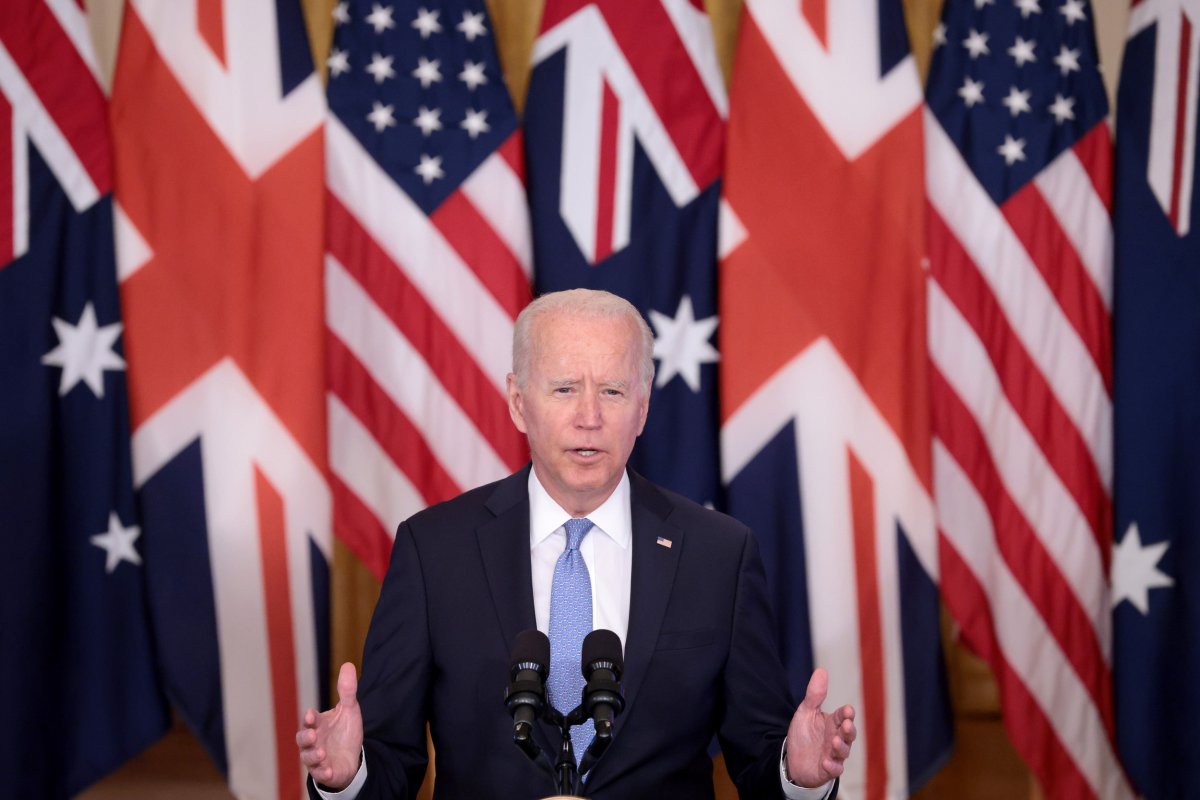China responded with criticism on Thursday to the formation of a new trilateral security partnership between the United States, Britain and Australia, seeing the new pact—called AUKUS—as pointedly targeting Beijing and its growing military capabilities.
The leaders of the three democracies met via video link on Wednesday to announce the first AUKUS initiative: to spend the next 18 months drawing up plans to help Australia deliver its first fleet of nuclear-powered submarines, which will be armed with conventional weapons.
Unveiling the new trilateral security partnership, Australia's Prime Minister Scott Morrison said the naval vessels would be built in Adelaide, and that Australia had no intention of acquiring nuclear weapons or a civil nuclear capability.
U.K. Prime Minister Boris Johnson described the undertaking as "one of the most complex and technically demanding projects in the world," while President Joe Biden said the three countries had taken the "history step" to formalize their alliance in recognition of "the imperative of ensuring peace and stability in the Indo-Pacific over the long term."
The AUKUS leaders did not mention China in their remarks, but the regional implications of the new defense pact appeared to have been felt across the Pacific.
China's Foreign Ministry spokesperson Zhao Lijian told a regular press conference on Thursday that the decision of the three governments to cooperate on Australia's nuclear-powered submarine program "undermines regional peace and stability and intensifies the arms race."
Zhao called the export of "highly sensitive" nuclear submarine technology "extremely irresponsible behavior."
Any regional mechanism "should not target or harm the interests of third parties by building exclusionary blocs," he said. "The relevant countries should abandon their Cold War mentality and narrow geopolitical ideas," Zhao added, "or risk shooting oneself in the foot."

In a pre-announcement press briefing, senior Biden officials said the new partnership was "not aimed or about any one country."
They stressed the "exceptional" and "one-off" nature of the decision to share sensitive propulsion technology with Australia—a "time-tested" American ally, according to a transcript released by the White House.
The administration officials called the establishment of AUKUS a fundamental decision "that binds decisively Australia to the United States and Great Britain for generations."
The new trilateral alignment, they said, was about "collaborating on joint capabilities and pursuing deeper interoperability" between the navies of the three maritime democracies. AUKUS will involve senior-level meetings and engagements, and cooperation on cyber, artificial intelligence and other emerging technologies.
The officials explained that submarines powered by nuclear reactors are superior in stealth, speed, maneuverability, survivability and can be deployed for longer periods. China's People's Liberation Army Navy already posses a small fleet of nuclear-powered and -capable submarines, which analysts say already constitutes a credible sea-based nuclear deterrent.
In 2016, Australia signed a deal with French contractor Naval Group—worth 90 billion Australian dollars ($65.7 billion)—to produce a fleet of diesel submarines. The latest U.S. and U.K. involvement means the agreement will be scrapped.
In a statement carried by Australia's ABC News, Naval Group called the announcement a "major disappointment."
In a joint statement, France's Foreign Minister Jean-Yves Le Drian and Defense Minister Florence Parly accused the U.S. of pushing aside a European ally. Former French Ambassador to the U.S. Gérard Araud tweeted: "The world is a jungle. France has just been reminded this bitter truth by the way the US and the UK have stabbed her in the back in Australia. C'est la vie."
Also on Wednesday, Tom Tugendhat, Conservative MP and chair of the British Parliament's Foreign Affairs Select Committee, wrote on Twitter: "The reason for all this is clear - China. After years of bullying and trade hostility, and watching regional neighbours like the Philippines see encroachment into their waters Australia didn't have a choice.
"Tonight, Beijing will have realised the pressure on Australia has triggered a response. This is a powerful answer to those who thought the US was pulling back and the propaganda claiming Washington wasn't a reliable ally.
Uncommon Knowledge
Newsweek is committed to challenging conventional wisdom and finding connections in the search for common ground.
Newsweek is committed to challenging conventional wisdom and finding connections in the search for common ground.
About the writer
John Feng is Newsweek's contributing editor for Asia based in Taichung, Taiwan. His focus is on East Asian politics. He ... Read more
To read how Newsweek uses AI as a newsroom tool, Click here.








